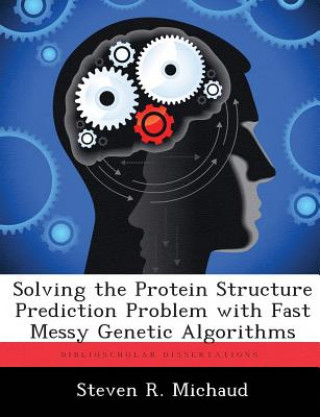
Code: 08250515
Solving the Protein Structure Prediction Problem with Fast Messy Genetic Algorithms
by Steven R Michaud
The ability to accurately predict a polypeptide`s molecular structure given its amino acid sequence is important to numerous scientific, medical, and engineering applications. Studies have been conducted in the application of Gene ... more
- Language:
 English
English - Binding: Paperback
- Number of pages: 262
Publisher: Biblioscholar, 2012
- More about this

You might also like
-

Middle Pillar
12.57 € -

Youth's Manual of Geography, Combined with History and Astronomy, Etc.
19.92 € -19 % -

Morceaux choisis des philosophes allemands modernes pour la classe de philosophie (Ed.1881)
23.55 € -

Letters from Continental Countries.
32.61 € -

Interview with the Antichrist
13.08 € -18 % -

Circus Boys Across the Continent
29.59 € -

Pieces of My Life
16.80 €
Give this book as a present today
- Order book and choose Gift Order.
- We will send you book gift voucher at once. You can give it out to anyone.
- Book will be send to donee, nothing more to care about.
More about Solving the Protein Structure Prediction Problem with Fast Messy Genetic Algorithms
You get 150 loyalty points
 Book synopsis
Book synopsis
The ability to accurately predict a polypeptide`s molecular structure given its amino acid sequence is important to numerous scientific, medical, and engineering applications. Studies have been conducted in the application of Genetic Algorithms (GAs) to this problem with promising initial results. In this thesis report, we use the fast messy Genetic Algorithm (fmGA) to attempt to find the minimization of an empirical CHARMM energy model and generation of the associated conformation. Previous work has shown that the fmGA provided favorable results, at least when applied to the pentapeptide [Met]-Enkephalin. We extend these results to a larger Polyalinine14 peptide by utilizing secondary structure information as both searching constraints and seeding the initial population. Additional efforts where conducted to improve the performance of the algorithm with respect to solving the Protein Structure Prediction (PSP) problem through a short-circuiting operator where complete evaluation of the fitness function is halted if initial results are not promising, and by conducting additional searches on faster machines in a heterogeneous environment. Results indicate that, on average, this localized search tends to produce better final solutions. Finally, the fmGA as applied to the PSP problem is analyzed and shown to have improved performance and effectiveness.
 Book details
Book details
Book category Books in English Society & social sciences Education
59.79 €
- Full title: Solving the Protein Structure Prediction Problem with Fast Messy Genetic Algorithms
- Author: Steven R Michaud
- Language:
 English
English - Binding: Paperback
- Number of pages: 262
- EAN: 9781288408719
- ISBN: 9781288408719
- ID: 08250515
- Publisher: Biblioscholar
- Weight: 472 g
- Dimensions: 246 × 189 × 14 mm
- Date of publishing: 06. December 2012
Trending among others
-

Cambridge IGCSE (R) & O Level Complete Physics: Student Book Fourth Edition
41.97 € -

Cambridge IGCSE (R) & O Level Complete Biology: Student Book Fourth Edition
41.97 € -

Cambridge IGCSE (R) & O Level Complete Chemistry: Student Book Fourth Edition
50.93 € -

Oxford IB Diploma Programme: IB Economics Course Book
62.31 € -

Oxford IB Diploma Programme: IB Theory of Knowledge Course Book
57.98 € -

Oxford International Primary Science Second Edition: Workbook 4
14.99 € -

Business Partner B1 Workbook
17.71 € -7 % -

AQA French A Level Year 1 and AS
50.33 € -

CompTIA Security+ Review Guide - Exam SY0-601
24.76 € -24 % -

Cambridge IGCSE (R) & O Level Complete Biology: Print and Enhanced Online Student Book Pack Fourth Edition
61.10 € -

geog.2 Workbook
11.47 € -6 % -

Oxford IB Study Guides: Economics for the IB Diploma
47.71 € -

Teach Reading With Orton-gillingham
18.82 € -10 % -

KS3 Maths 10-Minute Weekly Workouts - Year 7
8.04 € -8 % -

Blue Book of Grammar and Punctuation: An Easy- to-Use Guide with Clear Rules, Real-World Examples , and Reproducible Quizzes, Twelfth Edition
15.09 € -28 % -

Business Partner B1+ Workbook
16.80 € -3 % -

Powerful Teaching: Unleash the Science of Learning
26.17 € -26 % -

Business Partner B2 Workbook
16.80 € -3 % -

Embodied Teen
21.64 € -16 % -

(ISC) SSCP SG & SSCP Practice Test Kit, 3e
65.13 € -27 % -

Growth Mindset Classroom-ready Resource Book
16.20 € -28 % -

AQA A Level Biology Revision Guide
25.56 € -5 % -

UKCAT For Dummies
23.15 € -28 % -

Oxford International Primary Maths Second Edition: Practice Book 1
12.17 € -

Oxford International Primary Science Second Edition: Student Book 1
26.77 € -

Donny's Unauthorized Technical Guide to Harley Davidson 1936 to Present
47.91 € -16 % -

OET Speaking for Nurses Book 2
11.57 € -2 % -

Edexcel International GCSE Chemistry Student Book Second Edition
31.60 € -14 % -

Oxford International Primary Maths Second Edition: Practice Book 2
12.17 € -

Cambridge IGCSE (R) & O Level Complete Physics: Print and Enhanced Online Student Book Pack Fourth Edition
62.91 € -

OET Speaking For Nurses Book 1
12.78 € -

Walk Your Talk; Tools and Theories To Share Nonviolent Communication
29.29 € -

Oxford International Primary Maths Second Edition: Practice Book 3
13.58 € -

Social Skills Activities for Secondary Students wi th Special Needs, Third Edition
26.37 € -21 % -

AQA GCSE German Foundation Practice Papers
15.29 € -

geog.1 5th edition Workbook Answer Book
56.37 € -

New KS2 English Year 5 Foundation Grammar, Punctuation & Spelling Targeted Question Book w/Answers
8.95 € -5 % -

Making Escape Rooms for Educational Purposes
18.72 € -

Cambridge IGCSE (R) & O Level Complete Chemistry: Print and Enhanced Online Student Book Pack Fourth Edition
62.91 € -

New KS2 English Year 4 Foundation Grammar, Punctuation & Spelling Targeted Question Book w/Answers
8.95 € -5 % -

Oxford International Primary Maths Second Edition: Practice Book 5
16.10 € -

Education in the New Age
12.88 € -

240 Vocabulary Words Kids Need to Know: Grade 3
11.77 € -17 % -

Oxford IB Diploma Programme: Oxford IB Diploma Programme: IB Mathematics: applications and interpretation Standard Level Enhanced Online Course Book
95.13 € -

OET Preparation
9.65 € -

Speed and Accuracy: Multiplication
8.65 € -

ESL/ELL Teacher's Survival Guide: Ready-to-Use Strategies, Tools, and Activities for Teaching En glish Language Learners of All Levels, 2nd Edition
29.69 € -21 % -

KS3 Maths 10-Minute Weekly Workouts - Year 8
8.04 € -8 % -

Speed and Accuracy: Division
8.65 €
Collection points Bratislava a 2642 dalších
Copyright ©2008-24 najlacnejsie-knihy.sk All rights reservedPrivacyCookies



 15549 collection points
15549 collection points Delivery 2.99 €
Delivery 2.99 € 02/210 210 99 (8-15.30h)
02/210 210 99 (8-15.30h)